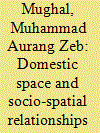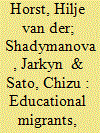| Srl | Item |
| 1 |
ID:
140101


|
|
|
|
|
| Summary/Abstract |
This article explores the changing use and management of domestic space and socio-spatial relationships constructed in a Pakistani rural setting. It offers a case study which highlights the central position of domestic space as a residential and social unit in rural Pakistan. It discusses how domestic space is appropriated in multiple ways into a social unit through social practice. Given that changes in the physical structure of any place lead to negotiation of social relationships, it is shown how recent modifications in design and structure of houses are indicative of, and to some extent facilitate, social change in rural Pakistan.
|
|
|
|
|
|
|
|
|
|
|
|
|
|
|
|
| 2 |
ID:
167120


|
|
|
|
|
| Summary/Abstract |
Previous research on transnational migration and information and communication technologies (ICTs) demonstrated how ICTs shape transnational social relationships. What remains less explored is how ICTs shape spatial dimensions of such relationships. Also, international educational migrants constitute a substantial part of transnational migration flow, yet their everyday lives are not well studied. Building upon material semiotic scholarship, we examine how ICTs shape socio-spatial dimensions of transnational relationships in the lives of educational migrants, and the impacts that such relationships have on their everyday lives. This research is based on the empirical exploration of 21 in-depth interviews with educational migrants who came from Central Asian and African countries to the Netherlands. We show that spatial relationships, such as co-presence and distance, are not naturally ‘given’ but are instead enacted in heterogeneous communication practices of educational migrants, and these relationships produce both enabling and constraining effects on their everyday lives.
|
|
|
|
|
|
|
|
|
|
|
|
|
|
|
|